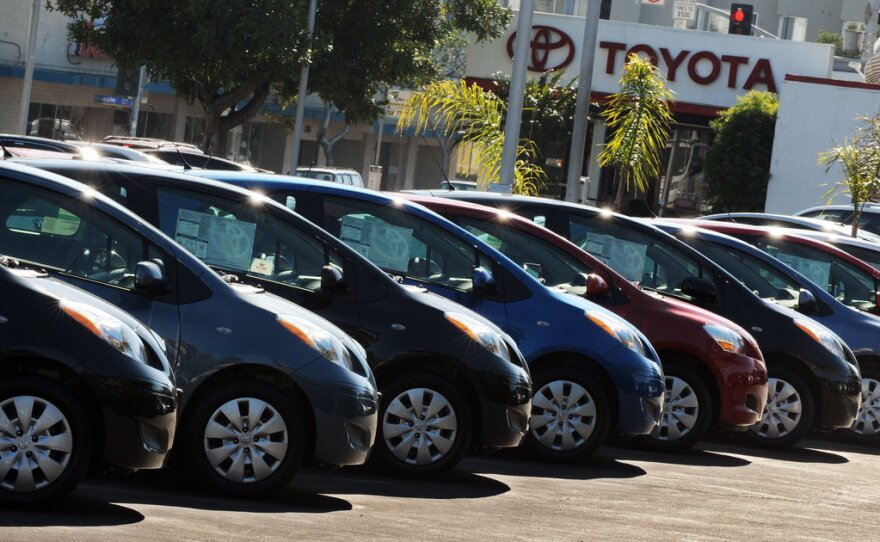Updated 7:30 a.m. PT:
Saying that "Toyota intentionally concealed information" and misled the public about the danger that some of its vehicles might suddenly accelerate, Attorney Gen. Eric Holder announced Wednesday that the automaker is being fined $1.2 billion for not being forthcoming after car owners started to complain in 2009.
It is "the largest criminal penalty imposed on a car company in the history of the United States," Holder said, and is merited by "shameful" conduct on the company's part. In addition to paying the penalty, Toyota will "fully admit wrongdoing," the attorney general added.
In essence, according to Holder, Toyota treated a public safety issue "as if it were a public relations problem" and tried to cover up the potential problems.
"Rather than promptly disclosing and correcting safety issues about which they were aware, Toyota made misleading public statements to consumers and gave inaccurate facts to members of Congress," Holder said. "And they concealed from federal regulators the extent of problems that some consumers encountered with sticking gas pedals and unsecured or incompatible floor mats that could cause these unintended acceleration episodes."
Car companies, Holder said, have a duty to tell customers about safety problems and fix them quickly. "Toyota violated this basic compact," he said.
"Other companies should not repeat Toyota's mistake," Holder added.
As The Associated Press reminds readers, until now "Toyota has blamed drivers, stuck accelerators or floor mats that trapped the gas pedal for the acceleration claims that led to the big recalls of Camrys and other vehicles. The company has repeatedly denied its vehicles are flawed." But it also has, as we reported earlier, settled some previous claims.
Justice has posted:
— Holder's "as prepared for delivery" remarks.
— The "deferred prosecution agreement" with Toyota.
— The "statement of facts" that lays out the government's findings.
As the statement of facts says, the potential problem with Toyota's vehicles first drew national attention in the fall of 2009:
"After a widely-publicized Aug. 28, 2009, accident in San Diego, Calif., that killed a family of four. A Lexus dealer had improperly installed an unsecured, incompatible rubber floor mat (an 'all weather floor mat' or 'AWFM') into the Lexus ES350 in which the family was traveling, and that AWFM entrapped the accelerator at full throttle. A 911 emergency call made from the out-of-control vehicle, which was speeding at over 100 miles per hour, reported, 'We're in a Lexus ... and we're going north on 125 and our accelerator is stuck ... there's no brakes ... we're approaching the intersection ... Hold on ... hold on and pray ... pray.' The call ended with the sound of the crash that killed everyone in the vehicle."
Over the next year or so, the statement continues, the company knew it had a problem but misled the public, the National Highway Traffic Safety Administration and Congress.
After Holder's announcement, Toyota issued a statement saying that the settlement is a "major step toward putting this unfortunate chapter behind us." The company's chief legal officer in North America, Christopher Reynolds, also says in the statement that:
"At the time of these recalls, we took full responsibility for any concerns our actions may have caused customers, and we rededicated ourselves to earning their trust. In the more than four years since these recalls, we have gone back to basics at Toyota to put our customers first."
The original post picks up the story and has background:
"One of the largest fines ever imposed on an auto maker" will be announced Wednesday morning, The Wall Street Journal writes.
Attorney Gen. Eric Holder and other federal officials are expected to say that Toyota Motor Corp. has agreed to pay about $1.2 billion to "end a criminal probe into its disclosure of safety issues," the Journal reports.
Holder, Transportation Secretary Anthony Foxx and U.S. Attorney for the Southern District of New York Preet Bharara are due to hold a news conference at 12:30 p.m. PT.
As Bloomberg News says, the settlement will end "a U.S. criminal probe. ... Toyota recalled more than 10 million vehicles worldwide in 2009 and 2010 following complaints of sudden, unintended acceleration. ... The probe examined whether Toyota made false or incomplete disclosures to regulators about defects in its cars, and how it handled drivers' complaints."
This is not the first large payout related to the sudden acceleration issue that Toyota has agreed to make.
The Associated Press notes that:
"From 2010 through 2012, Toyota Motor Corp. paid fines totaling more than $66 million for delays in reporting unintended acceleration problems. The National Highway Traffic Safety Administration never found defects in electronics or software in Toyota cars, which had been targeted as a possible cause by many, including some experts."
In late 2012, as we reported, "owners of Toyota vehicles that experienced sudden and unintended acceleration ... reached a settlement that could require the carmaker to pay as much as $1.4 billion in claims." At issue in those cases: the financial damage done to the car owners when the value of their vehicles dropped because of the reports about sudden acceleration.
A month later, in January 2013, Toyota settled lawsuits with the relatives of two people who died in crashes allegedly caused by sudden acceleration. Terms of the settlement were not disclosed.
Toyota is not the only automaker in the news this week because of safety issues. General Motors has now recalled more than 3 million vehicles in recent days because of various problems, and CEO Mary Barra has issued an apology for "the loss of life that has occurred." A defect in some GM vehicles' ignition switches has been linked to at least 12 deaths.






